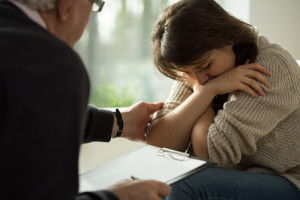How Is Depression Treated?
 Depression can affect people of all genders, ages and ethnicities, making it a serious mental health issue that is widely prevalent all across the globe. The World Health Organization estimates that 350 million people from around the world suffer from depression, the Office for National Statistics (ONS) found that nearly one-fifth of UK adults experience depression and one in five Americans suffer from some mental illness. Worst of all is that many people who are depressed do not seek treatment, which can make symptoms harder to deal with.
Depression can affect people of all genders, ages and ethnicities, making it a serious mental health issue that is widely prevalent all across the globe. The World Health Organization estimates that 350 million people from around the world suffer from depression, the Office for National Statistics (ONS) found that nearly one-fifth of UK adults experience depression and one in five Americans suffer from some mental illness. Worst of all is that many people who are depressed do not seek treatment, which can make symptoms harder to deal with.
There are some common signs and symptoms of depression like pessimism, trouble concentrating, decreased energy, feelings of guilt or worthlessness, insomnia, chronic aches or pains, persistent sadness or anxious feelings and thoughts of suicide. Despite common symptoms, no two people are affected by depression in the same exact way, which means there is not a one-size-fits-all treatment that cures it. However, those who seek treatment are much more likely to recover from their symptoms than those who do not receive help. With that said, check out some ways that depression is treated.
Psychotherapy
Psychotherapists like Stuart MacFarlane can help a depressed individual overcome their symptoms and is typically the first form of treatment. Typically called ‘therapy’ for short, psychotherapy involves a variety of treatment techniques where a depressed individual talks openly to a professional psychotherapist where they attempt to help the individual identify the factors that may be causing their depression. Sometimes these factors may be in part of heredity or chemical imbalances in the brain, but taking care of the psychosocial and psychological aspects of depression is extremely important.
At any rate, the psychotherapist will help the individual cope with life problems such as divorce, loss in the family, job loss or other major contributing factors that’s making the person feel depressed. Once these issues are identified, they may be able to offer ways to solve or improve those problems by restructuring the negative thought processes. This can help someone regain a sense of control and stability so they can live a more pleasurable life through coping techniques and problem-solving skills.
Life Style Changes
Some simple lifestyle changes can become powerful tools when treating depression. In some cases, they could be all an individual needs to overcome their symptoms, but, as a precautionary measure, professional treatment should still be sought after. Some lifestyle changes that can aid in the recovery of depression include:
- Regular exercise – it boosts levels of serotonin, endorphins and other good-feeling brain chemicals that can have effects similar to anti-depression medication. Something as simple as a half-hour walk everyday can be enough to get those positive vibes going.
- Healthy dieting – eating a well-balanced meal is imperative for both your physical and mental health. Retaining a normal eating schedule that’s healthy can help balance energy and minimize mood swings.
- Sleep – the amount of sleep you get can strongly affect mood. When you don’t get enough of it, you are more irritable, moody, sad and fatigued. Aim to get at least seven to nine hours of sleep each night.
- Reduce Stress – stress can impact the severity of depression, which makes it critical to reduce stress as much as possible. Consider finding ways to cut stress like distancing yourself from unsupportive relationships, minimizing workloads and decreasing other stressors.
Medication
Like mentioned earlier, chemical imbalances in the brain may contribute to depression and some medications may be able to help manage those chemicals. Your psychotherapist or mental health professional will be able to determine which medications may be right for you. An individual may take a few different medications until the right anti-depressant provides the best results.